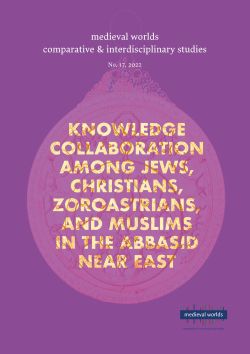 |
 |
Walter POHL – Andre GINGRICH (Eds.) - Nathan Gibson (Guest Ed.)
medieval worlds • no. 17 • 2022
Rémy Gareil
S. 167 - 184 doi: 10.1553/medievalworlds_no17_2022s167
Verlag der Österreichischen Akademie der Wissenschaften doi: 10.1553/medievalworlds_no17_2022s167
Abstract:
This paper explores Ibn al-Nadīm’s Fihrist, a major primary source for Abbasid intellectual history. Although its importance for the field has been acknowledged since its first edition at the end of the nineteenth century, the studies dealing with this encyclopedic work as a whole are remarkably rare, since its material has mostly been used by researchers looking for biographic details regarding specific scholars of the Islamic Middle Ages. Our research aims to examine how Ibn al-Nadīm depicts the religious affiliation of scholars and cases of interaction between Jewish, Christian, and Muslim intellectuals. It focuses on the seventh section (maqāla) of the work, which deals with the rational sciences, a field well known for involving scholars from different religious backgrounds in Abbasid centers of knowledge, especially in the context of translation activities. After some methodological remarks, two main lines of inquiry guide our study. First, we analyze whether Ibn al-Nadīm explicitly acknowledges the religious identity of the scholars he mentions, with what vocabulary, and in which circumstances. Second, we investigate the cases of »interreligious scholarly collaboration«, when Ibn al-Nadīm depicts scholars from different religious backgrounds working together, in order to determine his conception of the knowledge produced by the Abbasid intellectual milieu. We will argue that the way he deals with interreligious relations results in emphasizing the existence of a common knowledge, in Arabic, that is shared beyond communal boundaries. By focusing on the inner structure of this work, we aim to shed new light on the question of interreligious collaboration in Abbasid society, as well as to lay the groundwork for a better understanding of the relationship between the Fihrist and its social and cultural context.
Ibn al-Nadīm, Abbasid intellectual history, rational sciences, Islamic sciences, religious affiliation, biographical dictionary Published Online:
2022/11/30 07:14:51 Object Identifier:
0xc1aa5576 0x003dd9bb
Rights:https://creativecommons.org/licenses/by-nc-nd/4.0/
medieval worlds provides a forum for comparative, interdisciplinary and transcultural studies of the Middle Ages. Its aim is to overcome disciplinary boundaries, regional limits and national research traditions in Medieval Studies, to open up new spaces for discussion, and to help developing global perspectives. We focus on the period from c. 400 to 1500 CE but do not stick to rigid periodization.
medieval worlds is open to submissions of broadly comparative studies and matters of global interest, whether in single articles, companion papers, smaller clusters, or special issues on a subject of global/comparative history. We particularly invite studies of wide-ranging connectivity or comparison between different world regions.
Apart from research articles, medieval worlds publishes ongoing debates and project and conference reports on comparative medieval research.
Editorial
Ingrid Hartl and Walter Pohl
»The sun was darkened for seventeen days« (AD 797).
An Interdisciplinary Exploration of Celestial Phenomena between Byzantium, Charlemagne, and a Volcanic Eruption
Johannes Preiser-Kapeller and Ewald Kislinger
Knowledge Collaboration among Jews, Christians, Zoroastrians, and Muslims in the Abbasid Near East
Guest editor: Nathan Gibson
Knowledge Collaboration among Jews, Christians, Zoroastrians, and Muslims in the Abbasid Near East: Introduction
Nathan P. Gibson
Why Muslims Shouldn’t Practice Medicine. The Autobiographical Account of a Frustrated Physician, Ibrahīm al-Qalyūbī (fl. second half 7th/13th)
Ignacio Sánchez
Alī and “Sons of Ādurbādh”: Zoroastrians Priests in the Early Islamic Era
Kayla Dang
On Attributes and Hypostases: Muslim Theology in the Interreligious Writings of Patriarch Timothy I (d. 823)
Joachim Jakob
For the Care of Body and Soul: The Greek Bible and an Arab-Islamic Botanical Text in a 10th-Century Palimpsest Fragment
Matteo Pimpinelli
Interreligious Scholarly Collaboration in Ibn al-Nadīm’s Fihrist
Rémy Gareil
Project Reports
Indexing A Shared Knowledge Culture from Many Perspectives: The Historical Index of the Medieval Middle East (HIMME) as a Tool for Researching Diversity
Thomas A. Carlson and Jessica S. Mutter
Embedding Conquest: Naturalizing Muslim Rule in the Early Islamic Empire (Project Report)
Cecilia Palombo
|




 Home
Home
 Print
Print
 References
References
 Share
Share
